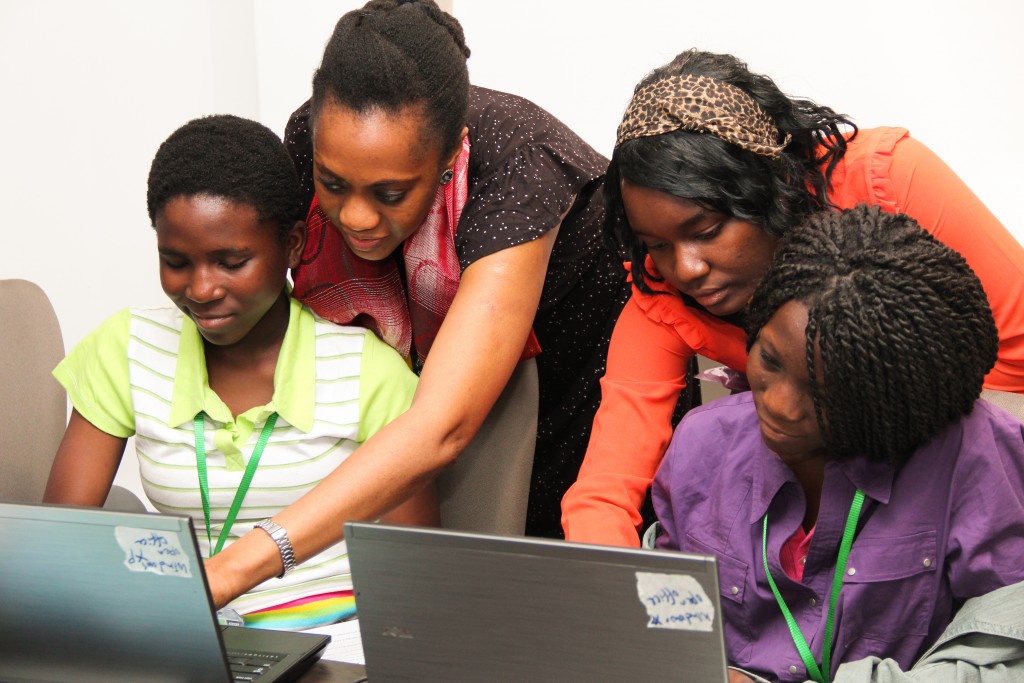This year marks the 60th anniversary for the Commission on the Status of Women (CSW), an annual, global forum that takes place in March. The 2016 theme is “Planet 50-50: Step it up for Gender equality” with a call to “Pledge for Parity.” Many pledges connect to Sustainable Development Goal (SDGs) 5, which strives for gender equality. Nestled within its target is 5.b, which aims to enhance “the use of enabling technology, in particular information and communications technology (ICT), to promote the empowerment of women.”
Gender parity in technology is a conversation that started during the formation of the Beijing Platform for Action in 1995. Twenty-one years later, the Internet and its various innovations have become an important vehicle of self-expression, political engagement, and commerce. Mobile technologies have become pervasive and data from the latest GSMA report indicate over 100% subscriptions in parts of Africa, and a 60% average penetration rate.
While ICTs have become an indispensable part of our daily lives and are used to address a range of social economic challenges, increasing productivity and improving access to vital services such as education and healthcare, they also pose new challenges, and new risks to women’s economic empowerment. This includes through discriminatory portrayals of women and online sexual harassment.
For an example of the former, let’s take the instance of the #SomeOneTell hashtag, commonly used in country twiffs (Twitter wars). As the Twitter users poke fun against different countries, the most common rebuttal is the use of women as weapons or trophies to win the argument. How beautiful, ugly, masculine or feminine the women in a country are, all come into play in these twiffs, and usually in a highly visualized manner, with images circulated and meme-fied to make the point. This is harmful objectification that makes it seem like women’s only value is in their looks and this portrayal can contribute to sex discrimination offline.
Online harassment is also unfortunately a common problem globally. It can include insistent poking on Facebook, stalking on Twitter, sexually violent language on message boards, comments sections and game rooms. It even includes digital “flushing” (receiving unsolicited nude photos, footage), or “revenge porn” when naked photos or video /audio is circulated without the consent of the person. The UN reported last year that almost 75% of girls and women have faced cyber violence.
Across Africa, women ranging from senior government officials, politicians, media and entertainment personalities, and students, are affected. There is evidence that the cases of cyber violence are growing. In South Africa, a study by the Center for Justice and Crime Prevention indicate that close to 40% of young people online have experience online violence. Even more worrying is that the evidence that violence begets violence, in that nearly 70% of perpetrators of violence have themselves been victims.
In Kenya, gender based attacks on the cyber space platform have resulted in death, health challenges and court cases. When Sitawa, a mental health advocate in Kenya, shared her story as a rape victim online so that others who have experience the ordeal can come out and speak out, online bullies made her feel like she was experiencing the rape ordeal again.
To be sure, ICTs also have been instrumental in tackling violence against women. Services such as Safecity in India and HarassMap in Egypt have led to more awareness. But, there is a need to deliberately tackle incidences of violence that result from the use of ICTs, otherwise women will not be able to fully take advantage of the resources and opportunities there.
But doing so brings many new challenges compared with offline violence, including working in a borderless environment with laws of multiple jurisdictions. Kenya is one of the few countries to have ICT-related offences stipulated in its laws at all. However, this has not always translated into prosecution. Police often lack the capacity to identify and capture digital evidence and the precedence to charge such crimes. Indeed, in a 2015 UN study of 86 countries, only 26 percent of the law enforcement agencies were taking appropriate action around cyber violence.
Fortunately, it is not all bleak. Companies like Facebook and Twitter are trying to better combat online harassment on their platforms. Online sexual harassment was recently a topic at the SXSW conference in the United States, garnering widespread media attention. And this month, President Barack Obama said the Internet is a public space where women deserve to live safely and without fear.
The African Development Bank invests heavily in ICT infrastructure on the African continent, and has recognized the need to protect ICT usage to achieve its objectives. In this regard, together with African governments and in partnership with Facebook and other development partners, the Bank is piloting a program, starting with Kenya, to train the police force on how to identify cyber based gender violence. It is also working with policy makers on ensuring that there are policies in place to fully prosecute these crimes across the continent.
As we pledge for parity in the use, access, creation and leadership in technology, we must ensure that we are working on ways to make it a safe space so that women truly can gain parity with men, and so that when a woman pings, she will get a respectful, non-harassing ping back.
Dr. Shikoh Gitau is an ICT expert and leads the technology and innovation work in the AfDB’s Office of the Special Envoy on Gender. You can follow her on Twitter @shikohtwit and contribute to this conversation, #makeITsafe.

